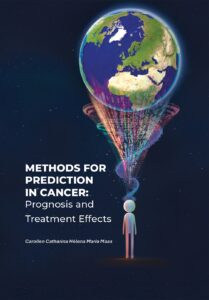PhD Defence Carolien Maas
This thesis examines cancer prognosis (Part 1) and treatment effects (Part 2) using statistical models. In Part 1, nationwide data from Dutch cancer patients (1989–2019) showed improved life expectancy due to better detection and treatments, though some cancers have poor outcomes. For melanoma patients undergoing sentinel lymph node biopsy, a model was developed to predict recurrence and mortality risks. Part 2 highlights that treatment decisions should consider personalized effects rather than averages. For patients with diffuse large B-cell lymphoma, high-risk patients benefit most from intensified treatment. Methodological advances were made in quantifying individualized treatment effects. This thesis makes five recommendations: 1) use life expectancy as a measure for prognosis and treatment effects, 2) use simple models, 3) update existing models before developing a new one but validate new models if you do, 4) strive to make personalized predictions, and 5) critically evaluate data analysis to ensure accurate information influences decisions.
